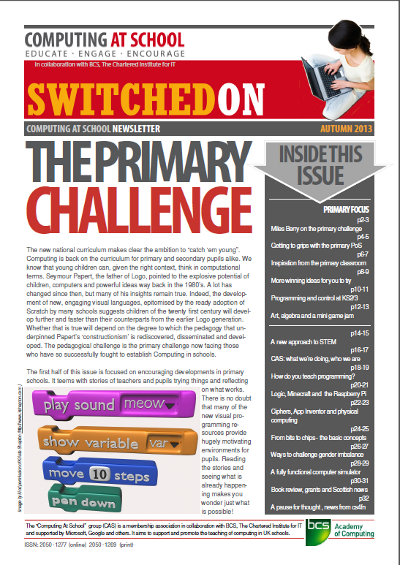The story of Computing at School from the UK
Publication date: October 7, 2014
On the 30th of September EU Code Week Ambassadors met in Brussels to exchange ideas and talk about how to move this initiative forward. One of the main questions asked by many was how has the UK managed to have computer science implemented into the schools curriculum from the primary level. I have tried to answer this question briefly and talked about the wonderful work of CAS (Computing at School) and the support of the UK government, however, I couldn’t tell the whole story from the beginning, as it was more appropriate to hear from those wonderful people directly.

I loved the quote by Nick Gibb MP – Minister of State for School Reform for the EU Code week, which explains clearly why coding became the focus of the new computing curriculum in the UK.
‘Learning to code and think computationally is an important skill for today’s children, which is why we have made it part of the new computing curriculum. We want to create a generation of innovative software developers. These events will open children’s minds to the world of possibility that can be created with digital technology.’ (Nick Gibb MP – Minister of State for School Reform, 2014)
Of course, as I mentioned before we haven’t just reached this point overnight, it took hard work from many wonderful people led by CAS (Computing at School). Simon Humphreys (National Coordinator, Computing At School) and Prof Simon Peyton Jones (Microsoft Research, Chair Computing At School) wrote a very informative and useful article to share how CAS (Computing at school) was formed, the aims and also very useful tips for other countries who are working towards having computer science included in their school curriculum.
Yasemin Allsop, EU Code Week Ambassador for the UK
The story of Computing at School for EU Code Week
by Simon Humphreys (National Coordinator, Computing At School) and Prof Simon Peyton Jones (Microsoft Research, Chair Computing At School)
In almost every country in the world, the realisation has dawned that young people should be educated not only in the application and use of digital technology, but also in how it works, and its foundational principles. Lacking such knowledge renders them powerless in the face of complex and opaque technology, disenfranchises them from making informed decisions about the digital society, and deprives our nations of a well-qualified stream of students enthusiastic and able to envision and design new digital systems.
After a decade of stasis, change has come to the computing curriculum in English schools, and substantial movement in Scotland and Wales, and computer science will, for the first time, become part of every child’s education. This change has been driven not by institutions or by the government, but by a grass-roots movement of parents, teachers, university academics, software developers, and others. A key agent in this grass-roots movement — although not the only one is the Computing at School Working Group (CAS).
Computing At School
The Computing at School working group (CAS) was born at Microsoft Research Cambridge, at a meeting in 2008. Our fundamental goal is to establish computer science as a proper, rigorous, high status school subject discipline —the “fourth science” — and to build a network that supports teachers as they engage with computer science in their classrooms.
CAS has now developed into a real community. From four people in 2008, it now has 15,000 members and is growing at about 800 members/month. There are several sorts of glue that hold the group together:
- First, a clearly articulated purpose, described at the start of this section. It sounds obvious, but being absolutely clear what you stand for is powerful glue.
- Face to face meetings are much more effective than virtual ones for generating a shared sense of purpose and enthusiasm, so we started local “hubs” for (mainly) teachers to share ideas. Initially, we started four hubs but there are now 120, spread right across the country. Each is run by a volunteer leader, with very modest central support; they typically meet once a term.
- We held our first national CAS Teachers Conference in 2010, with much trepidation, but again the “buzz” generated by the face-to-face interaction of 200+ school teachers was overwhelming, and the conference has become an annual event (generously hosted by the Birmingham Computer Science department). Most of the day consists of dozens of workshops, many of them run by teachers themselves.
- Roger Davies (himself a teacher) launched a termly CAS Newsletter. Worthy causes often have newsletters full of descriptions of worthy meetings. Somehow Roger managed the trick of building a newsletter that you might actually want to read, and repeating the trick term after term
- Until 2012 CAS was simply a Google email group. We had repeatedly discussed developing some kind of CAS-specific forum, where members could share ideas, upload resources, and comment on and improve those uploads. We investigated off the shelf solutions but none seemed right for us. Finally Michael Kölling and Neil Brown, at the University of Kent, decided to clone their existing Greenroom site (a community site for people using Greenfoot, a Java programming environment for schools). The result was CAS Online, which as well as forums now supports uploading resources, commenting on them and improving them, maps showing where members and hubs are, listings of events, and more.
- We have launched, with support from the Department for Education, a training programme for teachers. The Network of Excellence is built on three main principles for effective CPD:
-
local training
-
face to face training
-
teachers teaching teachers

Computer Science in the school curriculum
Computer Science is not, as many Head Teachers, parents etc might think, a geek subject appropriate for socially-challenged male university students, beyond the scope of a school, let along primary school. In so far as they think of computing as a school subject at all, it is as a technology subject equipping students with useful life or employment skills, and certainly not as a subject discipline like physics.
Computer science is a discipline. It encompasses foundational principles (such as the theory of computation) and widely applicable ideas and concepts (such as the use of relational models to capture structure in data). It incorporates techniques and methods for solving problems and advancing knowledge (such as abstraction and logical reasoning), and a distinct way of thinking and working that sets it apart from other disciplines (computational thinking). It has longevity (most of the ideas and concepts that were current 20 or more years ago are still applicable today), and every core principle can be taught or illustrated without relying on the use of a specific technology.
Seen from this point of view, our critique of current education in digital technology is precisely that it focuses too much on technology. We teach our children how to use office productivity software, or other undeniably useful skills in using computer systems, but (at school level) we have lost sight of, or perhaps never even considered, the underlying discipline. In Britain the school subject is even called Information and Communication. Technology, which focuses attention on technological artefacts rather than on principles and ideas. We have fatally entangled the message (ideas, principles) with the oh-so-seductive medium (devices, software, even programming).
A new National Curriculum was introduced in England in September 2014 with a new subject! Computing. The aims for this subject are:
“The National Curriculum for computing aims to ensure that all pupils:
- can understand and apply the fundamental principles of computer science, including logic, algorithms, data representation, and communication
- can analyse problems in computational terms, and have repeated practical experience of writing computer programs in order to solve such problems
- can evaluate and apply information technology, including new or unfamiliar technologies, analytically to solve problems
- are responsible, competent, confident and creative users of information and communication technology.“
This is a major, enduring outcome: these aims clearly establish computer science in the school curriculum from primary school onwards, as part of a balanced curriculum involving both computer science and digital literacy.
Programming in school curriculum
Recently, and coincidental to the curriculum changes, there has been a call to encourage all people, young and old, to take up programming (coding). The availability of software tools such as Scratch, or Kodu have made programming accessible and fun for all. So too have cheap, versatile hardware platforms such as the Raspberry Pi. Of course, Computer Science is more than programming, but programming is an absolutely central process. In an educational context, programming encourages creativity, logical thought, precision and problem solving, and helps foster the personal, learning and thinking skills required in the modern school curriculum. Programming gives concrete, tangible form to the idea of “abstraction”, and repeatedly shows how useful it is. It should be every child’s right to “have a go” at programming in school equivalent to activities such as writing a poem, playing sport, learning a musical instrument or drawing a picture.
Initiatives like the EU Code Week provide a focus for schools and young people to have a go at programming, to participate with friends and peers across Europe, to collaborate with each other on exciting and motivating projects, to learn about the technology that surrounds them and perhaps most important to have fun!
Reflections
Although our journey is far from over, the landscape is quite different now from when we began. What have we learned?
- One simple message. CAS exists to do just one thing: to establish computer science as a proper school subject, from primary school onwards. We express this goal in many different ways, but it is still one goal.
- Explain what computer science is We need to find ways to explain what our discipline is, in ways that makes sense to parents, civil servants, and politicians, not just to the technical community.
- Start with primary. Although it is wildly ambitious to seek to establish computer science in school education starting even in primary school, it is a natural consequence of seeing computer science as an educationally foundational discipline (like maths, or physics), rather than as a niche specialisation for geeks.
- Diversity: not just teachers. Right from its foundation, CAS has been open to any individual who wants to fix the UK’s education system. As well as school teachers, CAS members include university academics, school governors, parents, software developers and IT professionals, educational advisers, members of professional societies, and so on.
- There is no“them”; there is only us. CAS has no smoothly-functioning headquarters with dozens of staff members working away. We do now have a couple of staff FTEs, but to a first approximation CAS is all periphery and no centre. This is curiously liberating. Everyone knows that there is no point in saying “CAS should do X or Y”, because the rejoinder will surely be “Excellent, can you make that happen?”. CAS functions only because its members are proactive: see an opportunity and get on with it.


